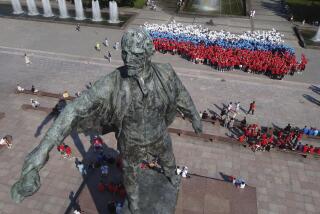Don’t Let Milosevic Off the Hook Again
- Share via
In a rush to bring NATO’s bombing campaign against Serbia to a rapid conclusion, Washington and other European capitals are again being gripped by the urge to capitulate. Less than four years after the Dayton accords halted the fighting in Bosnia, Western officials are suggesting that the same model should be used in Kosovo.
This news should chill the hearts of all Kosovo Albanians. The Dayton accords may have stopped the killing, but they also saved the political life of Serbian strongman Slobodan Milosevic, ratified Serbian aggression, cast dark shadows over Bosnia’s viability as an independent state and doomed a million Bosnians to life in exile from their original homes.
Knowing what our leaders know now about Dayton and Milosevic, it is incomprehensible that they would willingly repeat the same error, yet this is precisely what is happening now with Kosovo. The only consolation for the Kosovo Albanians is that they can have advance notice of a few things that the Bosnians are already learning from experience:
First, genocide pays. As his forces ran rampant through Bosnia, Milosevic was offered progressively sweeter peace deals until he accepted. The Dayton accords were more favorable to the Serbian regime and its Bosnian Serb proxy than the Owen-Stoltenberg plan, which in turn was more favorable than the earlier Vance-Owen blueprint. When Western officials finally resorted to NATO airstrikes to bring Milosevic to the table at Dayton, they portrayed the bombing and the peace process as a marriage of military force and diplomacy. In fact, every pinprick bombing was reversed de facto by Western concessions to the Serbian regime in the peace settlement.
Today, the same thing is happening in Kosovo. Milosevic is set to receive a settlement that is more favorable to him than February’s Rambouillet accords. Never mind that since then, his forces have killed thousands of Kosovo Albanians, driven more than 1 million others from their homes, raped countless women, razed hundreds of villages and attempted to eradicate birth records and other elements of Albanian culture and society. The West’s response? Airstrikes against a relatively small number of Serbian targets in a campaign designed not to defeat Milosevic or to make him pay the necessary price. It is offering him a weaker, U.N.-approved implementation force and may even be backtracking on key elements of the partial autonomy promised to the Kosovo Albanians.
Second, the Kosovo Albanians shouldn’t believe everything they are told or that they read in the coming peace treaty. At Dayton, the administration gave the Bosnians an unconditional commitment to arm and train their forces so that they could defend themselves. Since then, it has delivered only a small fraction of what a study that the administration itself commissioned found would be necessary. In addition, it has repeatedly imposed conditions on the program.
The Dayton accords called for the return of all refugees and displaced persons to their homes. In reality, more than half of the people displaced during the war are still displaced. Only 5% of the mostly Muslim refugees from the Republika Srpska have been able to return.
Ratko Mladic and Radovan Karadzic, the two leading Bosnian Serb war criminals, remain at large. Hundreds, if not thousands, of others who are almost certainly guilty have not even been indicted by the U.N. war crimes tribunal. Successive elections that were meant to promote the democratic transformation of postwar Bosnia have instead entrenched nationalist Serbian, Croatian and Muslim parties.
Third, the Kosovo Albanians should not count on sustained Western attention to issues that are critical to their post-settlement future. The Clinton administration rebuts virtually every criticism of the Dayton accords by pointing out that they saved lives by ending the fighting in Bosnia. This is true, but they also should have paid attention to the quality of life of the survivors. Our standard for success should be much higher than separating the combatants, allocating the spoils to the victor and inserting international peacekeepers for an indefinite deployment.
We should solve the problem once and for all by ensuring that Milosevic is removed from power. He has started four wars and is responsible for the deaths of 250,000 people and the displacement of 4 million others. Montenegro, the Muslims of the Sandjak and the Croatians and Hungarians in the Vojvodina may be next in his sights. The future of the Kosovo Albanians, other non-Serbs in the Belgrade regime’s cross-hairs, Balkan security and NATO’s credibility demand that the United States and its allies defeat Milosevic, not save him once more. The real lesson from Dayton is that the U.S. should not make the same mistake twice.
After the genocide in Kosovo, Milosevic cannot be rewarded with a settlement more favorable to him--or even equal to--the Rambouillet agreement. That would not be victory. It would be appeasement.
More to Read
Sign up for Essential California
The most important California stories and recommendations in your inbox every morning.
You may occasionally receive promotional content from the Los Angeles Times.










